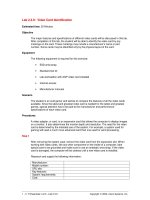Tài liệu 204360_IDC ppt
Bạn đang xem bản rút gọn của tài liệu. Xem và tải ngay bản đầy đủ của tài liệu tại đây (153.47 KB, 10 trang )
W H I T E P A P E R
V a l u e o f C e r t i f i c a t i o n : T e a m C e r t i f i c a t i o n a n d
O r g a n i z a t i o n a l P e r f o r m a n c e
Sponsored by: Microsoft
Cushing Anderson Peter McStravick
November 2006
IDC OPINION
After years of building IT infrastructure to alternately enable new business models,
drive new revenue, accelerate growth, or reduce costs, IT organizations are now
striving for increased service excellence as the driver of IT policy. To meet this goal,
IT executives and their functional managers must examine the kinds of skills their
teams require and, where relevant, seek to improve those skills. IDC believes:
! Team skill is directly responsible for organizational performance in several key IT
functional areas.
! Increasing the concentration of Microsoft-certified team members on a team
directly impacts team performance.
! The teams at the top tier of performance have between 40% and 55% of their
teams certified on relevant Microsoft technologies and processes.
This research demonstrates that for each new team member certified, team
performance increases. Every time.
Global Headquarters: 5 Speen Street Framingham, MA 01701 USA P.508.872.8200 F.508.935.4015 www.idc.com
2 #204360 ©2006 IDC
IN THIS WHITE PAPER
In this white paper, IDC describes the significant results of a recent survey on IT
organizational performance of 1,200 teams managed by more than 400 IT managers.
It describes the link between organizational performance and team skill and
demonstrates the link between certification and performance in both general
excellence and specific functional capability.
SITUATION OVERVIEW
IT Priorities Focus on Service Improvement
A recent survey of more than 400 IT managers found a predominant theme in
corporate IT strategy objectives: IT strategy is intended to improve service delivery.
With its role as a business enabler, IT service delivery has transcended "business
transformation" through accelerated change and even "cost reduction" as the
motivation for many IT-related projects.
This is an important shift that IT managers must respond to through staffing and other
activities. While enterprises and their IT leaders were aggressively using technology
to respond to and transform their business as recently as 2004, new findings show a
consolidation or a regrouping of effort to focus on improving existing processes and
the resulting services delivered.
To respond to this shift in emphasis, IT executives and their functional managers
must examine the kinds of skills their teams require. More specifically, IT managers
must seek to maximize the value of their teams to improve service delivery and
performance.
Certification Improves Service Performance
As most managers would agree, important IT functions require a significant proportion
of task- and technology-related skills to perform their assigned duties. Not
surprisingly, 80% of IT managers believe their teams require a significant amount of
task-specific skills to perform their assigned duties.
And while most managers believe that certifications are important to team and
organizational performance, most IT managers don't realize the impact their teams'
skill has on the teams' ability to perform at a high level.
Recent research examined the impact of Microsoft certification on IT performance.
Asking detailed questions of IT managers who together managed more than 1,200
teams, IDC examined the relationship of the performance of those teams to the
percentage of each team that was certified by Microsoft on a variety of technologies.
The results were clear: Microsoft certification, as a measure of skill, was positively
correlated to performance improvement.
The research examined both general service excellence and specific measures of
task-level performance: In both types of performance, certification matters.
©2006 IDC #204360 3
Certification Improves Both General and Functional Performance
General Service Excellence: Certifications Enable Agility
and Security
Other IDC research has uncovered six general service goals that IT organizations are
increasingly striving for:
! Agility
! Enabling customer access to Internet-based apps
! Enabling employee access to Internet-based apps
! IT efficiency
! Response time for standard or routine tasks
! System/information security
IT organizations often change procedures, install technology, and even reorganize
their staff to achieve these goals. However, IT managers have a more reliable and
predictable tool at their disposal: Certification.
Certification, at its core, is simply an attestation to the capability of the test-taker, a
measure of skill on particular tasks. To design a reliable and informative certification,
the certification sponsor attempts to isolate those skills and behaviors that improve (or
retard) performance, and develop a test that reliably predicts the test-taker's
knowledge of those items. So, to the extent the test elements are relevant to a
particular organization, the test-taker who passes a test has demonstrated a level of
capability or proficiency that the certification sponsor says is sufficient to improve
performance. This research certainly confirms that conclusion.
For instance, in a comparison of a "low density" of IT-certified staff with a "high
density" of IT-certified staff, it was clear that an increase in the percentage of
Microsoft certification increased the overall performance IT organizations strive for in
agility, efficiency, and security (see Figure 1).
But general excellence in "agility" or even "IT efficiency" is not what most managers
strive for. They want functional excellence in areas like "network security" or
"application development" or even "IT help desk operations." Here the research was
equally conclusive; each new certification increased team performance. Figure 2
illustrates the steady increase in average team performance as the percentage of
team certified increases.
This research confirms what managers may intuitively understand: that for each
additional member of a team certified, team performance increases. Whether the
increase is from 37% to 38% of the team being certified or from 60% to 61% of the
team, the team performance increases overall.
4 #204360 ©2006 IDC
FIGURE 1
General IT Service Performance Comparison Between Low and High
Density of Microsoft Certification
8.2
8.4
8.4
8.4
8.5
8.5
6.6
7.0
7.1
7.2
7.3
7.5
12345678910
Client access to applications
System/information security
Employee access to applications
IT efficiency
Response time
Agility
(Performance category)
20% or less
80% or more
n = 400
Notes:
Scale is 1–10, with 1 = far worse than industry average, 5 = industry average, and 10 = far better
than industry average.
Movement of 0.5 or more is significant at this sample size.
Source: IDC's IT Manager Survey, 2006
©2006 IDC #204360 5
FIGURE 2
Relationship Between Performance and Microsoft Certification
35
40
45
50
55
0 102030405060708090
(Performance percentile)
(Percent of team certified)
n = 5,534 responses across 31 KPIs
Source: IDC's IT Manager Survey, 2006
In fact, this research shows that there is even a strong correlation between "top tier"
performance and the percentage of a team that is certified. Organizations that had
between 40% and 55% of their team members certified performed in the top 20%, or
the "top tier," of all organizations. Though the percentage varied depending on the
specific functional area, managers can use that benchmark as a rough target to
achieve high performance. For instance:
! Teams responsible for network security or network systems and software that
had between 40% and 45% of the team certified by Microsoft performed in the
top tier of all 400 organizations that responded.
! For traditional application development, database development, or Web
application development teams, when between 40% and 50% of the team is
certified, the organization is more likely to perform in the top tier.
Managers who strive for high performance must look to team skill as a specific,
appropriate opportunity for improvement. It is important to reinforce, however, that
every increase in team certification increases team performance.
Two-thirds of managers believe that certifications improve the level of service and
support offered to IT end users/customers, and three-quarters believe that
certifications are important to team performance. This research demonstrates that
having sufficient percentage of team members certified can increase IT organizational
performance by up to an average of 11 percentage points (see Table 1).









